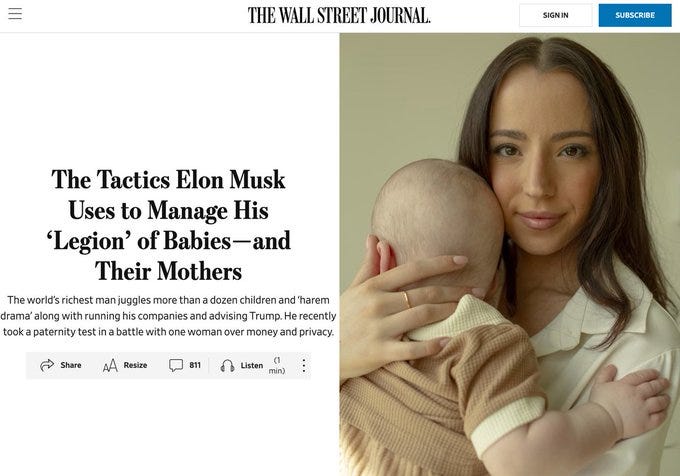I wasn’t going to share this essay until next week, but the latest WSJ article regarding the Ashley St Claire and Elon Musk baby drama made me feel like this was the perfect fit for today’s online narrative—and was a timely reminder of why privacy is so important, so sacred.
Read what I had to say about it on 𝕏
If you’re anything like me, you’re probably feeling tired of the spectacle. Tired of curated identities. Tired of influencers choreographing their morning routines for strangers and calling it authenticity.
What used to be intimate is now brand strategy. What used to be shared in whispers is now broken down into clickable parts. We’re documenting our dates, aestheticizing our pain, filming our meals from four angles—and pretending the lens hasn’t changed the experience.
But it has.
This essay is a reflection on what we lose when we live for the feed, how real connection gets diluted through performance, and why the most magnetic people today aren’t the ones broadcasting every detail—but the ones who still keep something for themselves.
Once upon a time, privacy was the default. You didn’t have to announce your engagement, your grief, your lunch. Most of life happened off the record—unseen, uncurated, unarchived. Moments existed to be lived, not documented.
Even the most mundane acts of intimacy—a phone call on a landline, a handwritten letter, a walk with a friend—were rich with presence. Not because they were special, but because they were undisturbed.
Now, we’ve reversed the default. Everything is potentially content. The wedding isn’t official until it’s posted. The vacation isn’t real until everyone’s been tagged. The moment isn’t meaningful unless someone else can see it.
We’re not just living our lives. We’re formatting them. For the algorithm. For the audience. For the imagined reaction.
This shift didn’t happen all at once. It crept in slowly, under the banner of connection and creativity. First came the blogs, then the vlogs, then the daily story updates. Platforms encouraged us to share more, to open up, to be "real."
But the realness was still a performance. It still had a camera angle.
To be private in the age of public performance is to opt out of a system that constantly asks you to explain yourself. To keep something sacred is to refuse conversion into content. And that refusal—that boundary—has become rare enough to feel powerful.
Because in a world that equates visibility with value, privacy becomes an act of self-possession, self-respect.
We think of intimacy as closeness. But real intimacy is trust. And trust, by nature, is selective. It can’t exist without discretion. If everyone has access to everything, nothing means anything.
The problem isn’t that we share. It’s that the sharing becomes compulsive. It becomes primary. It replaces the experience itself. Performance is replacing presence.
When you cry and your first thought is to grab your phone, you’re no longer feeling—you’re documenting. When you go on a walk and think about how to caption it, you’re not walking—you’re framing.
Remember when Selena Gomez recorded herself crying for TikTok and became a meme? Yeah, the people know when you’re being authentic—and this performative virtue signaling has really started to rub some of us the wrong way.
Selena ended up deleting the video the same day, but it was too late. The internet had already said, “nah, you live here now.”
She was the embodiment of how presence is replaced with narration. And intimacy becomes something to manage rather than something to feel.
The influencer who sets up three cameras before pouring their coffee isn’t doing anything wrong. But they are creating a replica—a version of morning that feels real, but isn’t. A version of self that feels honest, but isn’t. And the more we consume these replicas, the more our internal sense of what’s real begins to distort.
It’s not about judgment. It’s about erosion.
Because the danger of performance is not that it’s fake—but that it becomes real. You start to believe in the version of yourself you’ve created. You start to measure your life by how it looks from the outside.
And slowly, quietly, you forget what it feels like to live without an audience.
We’ve confused confession with connection. We think oversharing is depth. But true intimacy doesn’t require full disclosure—it requires trust. And trust isn’t about volume. It’s about discernment.
There’s power in what you don’t share. Not because you’re hiding, but because you’re holding.
Real privacy isn’t secrecy. It’s sovereignty. It’s the ability to decide who sees what and when. It’s the ability to contain your own experience long enough to actually feel it before you explain it.
The internet has trained us to package every emotion, every milestone, every thought into something consumable. But not every part of you needs to be consumed.
Some things are meant to be metabolized, not posted.
Social media made it easy to collapse the line between vulnerability and exhibitionism. But true intimacy isn’t loud. It’s not optimized. It doesn’t trend. It reveals itself slowly, quietly, through shared reality—not through declarations.
The deepest parts of a person are rarely the most visible.
When you’re always performing, you forget how to just be. You don’t know who you are without the likes, the tags, the audience.
But presence isn’t something you can perform.
Presence is a full-body yes to the moment you’re in. And you can’t get there when part of you is always archiving it, editing it, publishing it.
Privacy lets you stay inside your own experience.
We used to be drawn to mystery. To restraint. To the allure of the unknown. Now, that kind of presence feels almost radical.
Think about the people who still have some mystique—artists, thinkers, leaders who don't overshare. Their words carry more weight because they haven’t spent five years explaining themselves.
They don’t narrate. They don’t caption. They just live—and when they do speak, it matters.
Mystery is no longer a branding strategy. It’s a kind of spiritual hygiene.
And in a world obsessed with proof, it’s the people who keep something for themselves who feel the most magnetic.
Platforms reward performance. They reward extremes. The loudest voice in the shortest time wins.
What gets amplified is whatever is easiest to digest—not what’s most worth hearing.
That’s why thoughtful content sinks while spectacle floats. It’s not because people are shallow. It’s because the systems are designed that way.
Take the 1,000 guy challenge. A stunt framed as empowerment that instantly trended, and circulated—not because it was profound, but because it was provocative. The system didn’t reward insight. It rewarded shock.
But human beings aren’t designed that way. We need nuance. We crave depth. We long for the kind of connection that doesn’t end in a share button.
So when we give all our best selves to the feed, we’re left with very little for the people who actually matter. And very little for ourselves.
There’s a kind of sexiness to being hard to read. The people who don’t name drop. The ones who don’t need you to know everyone they’ve ever slept with or which famous person DM’d them once in 2020. It’s not secrecy. It’s self-respect.
Discretion is a flex. Because it signals that you’re not desperate for external validation. And that might be the rarest—and hottest—signal left.
I’ve started keeping more to myself. Not because I’m hiding. But because I’m rebuilding.
There’s something deeply nourishing about having parts of your life that no one knows about. Projects that aren’t posted. Relationships that aren’t public. Pain that isn’t aestheticized.
It reminds me that I’m not a brand. I’m a person. And my value isn’t something to be algorithmically verified.
Privacy, in this sense, isn’t a step back. It’s a homecoming.
So what does this look like in practice?
It could mean delaying your posts. Sitting with a moment instead of documenting it.
It could mean designating some parts of your life as strictly off-limits for public consumption.
It could mean writing without publishing. Creating without monetizing. Feeling without framing.
Privacy isn’t a retreat. It’s a redirection. It’s how you return to yourself, in a world that keeps asking you to explain, share, promote.
We talk about privacy like it’s a luxury.
But maybe it’s a lifeline.
Not because you owe anyone silence—but because you owe yourself the space to be a whole human, not just a visible one.
What you hold back doesn’t make you smaller. It makes you real.
And in a culture that confuses exposure for empowerment, that might be the most intimate act of all.
Not ready to subscribe but want to support my work? Consider buying me a coffee :)
















We had an icebreaker at work a while back and the question was "what are you passionate about?"
Coming from a long history of workplaces with a "Bring Your Whole Self to Work" philosophy, and realizing how spotty/borderline toxic those can be if you don't think a certain way, I answered the passion question: "I'm passionate about my privacy."
Very thoughtful and well written! Thank you!